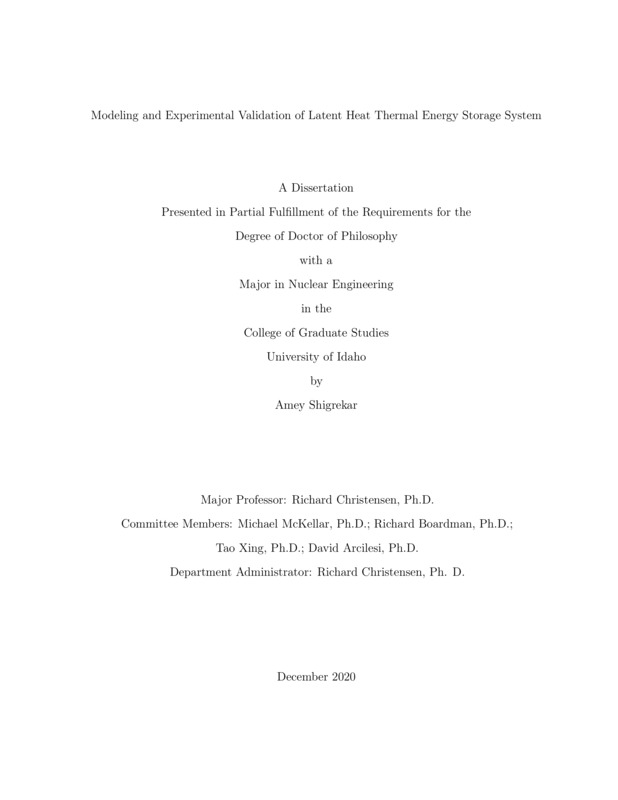Modeling and Experimental Validation of Latent Heat Thermal Energy Storage System
Shigrekar, Amey. (2020-12). Modeling and Experimental Validation of Latent Heat Thermal Energy Storage System. Theses and Dissertations Collection, University of Idaho Library Digital Collections. https://www.lib.uidaho.edu/digital/etd/items/shigrekar_idaho_0089e_11425.html
- Title:
- Modeling and Experimental Validation of Latent Heat Thermal Energy Storage System
- Author:
- Shigrekar, Amey
- Date:
- 2020-12
- Embargo Remove Date:
- 2022-02-22
- Keywords:
- Experimental Latent Heat Numerical Modeling Thermal Energy Storage
- Program:
- Nuclear Engineering
- Subject Category:
- Engineering; Energy
- Abstract:
-
In an effort to address the detrimental effects of climate change, a paradigm shift has taken place over the last couple of decades to switch from fossil fuel-based energy sources to clean energy. This change, along with the ever growing need for energy has facilitated the increasing penetration of renewable energy sources such as wind, solar, and hydropower. Although renewable energy can indisputably minimize the threat of global warming, their dependency on weather conditions and diurnal variations leads to inconsistencies in energy supply. To overcome this intermittency, these clean energy sources are quite often backed-up by fossil-fuel generators, thus defeating the purpose of clean energy establishment.
In order for renewable energy sources to become completely reliable as a primary source of energy, it should be stored during hours of excess production and be ready to use during periods of excess demand. This can be achieved by incorporating energy storage systems. Currently, thermal energy storage (TES) is the only technology to be deployed on a gigawatt scale, and specifically the sensible heat TES. This technology is expensive and in some cases, intrinsically consumes energy to prevent the storage medium from freezing. In comparison, latent heat storage designs could theoretically offer higher gravimetric storage capacities, resulting in smaller storage sizes. However, low thermal conductivities of phase change materials hinders the realization of this technology's potential, thereby preventing large scale deployment. To overcome this issue, several modifications to the TES designs have been undertaken. Regardless, the models developed so far are high-fidelity and high-complexity, design specific, and therefore computationally expensive. To evaluate the benefits of coupling latent heat TES systems, integrated systems-level analyses need to be carried out. This requires simpler, yet, accurate models.
In this dissertation, simplified, transient, validated models are developed for a latent heat thermal energy storage system. The modeling effort includes the analysis of three models, comparison of these models to a commercial CFD tool, and verification and validation using results acquired by performing experiments on a bench-scale latent heat thermal battery. To enhance heat transfer and overcome the underlying deficiency of PCMs, finned tube design is used. Preliminary analysis is conducted by assuming pure conduction within the phase change material, however, this is modified to accommodate for natural convection, by deriving an apparent thermal conductivity for the liquid phase. This apparent thermal conductivity is based on a correlation that includes the Rayleigh number, along with coefficients that are acquired empirically by trial and error method. The coefficients C and n for the geometry considered in this study are 0.228 and 0.25, respectively. To account for the presence of fins, a novel approach based on the thermal resistance network is applied to derive an effective thermal conductivity. The combination of this effective thermal conductivity and the apparent thermal conductivity, is applied to the liquid domain to model phase change in a finned tube system, that experiences a combined, natural convection- and conduction-based heat transfer.
- Description:
- doctoral, Ph.D., Nuclear Engineering -- University of Idaho - College of Graduate Studies, 2020-12
- Major Professor:
- Christensen, Richard
- Committee:
- McKellar, Michael; Xing, Tao; Arcilesi, David; Boardman, Richard
- Defense Date:
- 2020
- Identifier:
- Shigrekar_idaho_0089E_11425
- Type:
- Text
- Format Original:
- Format:
- application/pdf
- Rights:
- In Copyright - Educational Use Permitted. For more information, please contact University of Idaho Library Special Collections and Archives Department at libspec@uidaho.edu.
- Standardized Rights:
- http://rightsstatements.org/vocab/InC-EDU/1.0/

